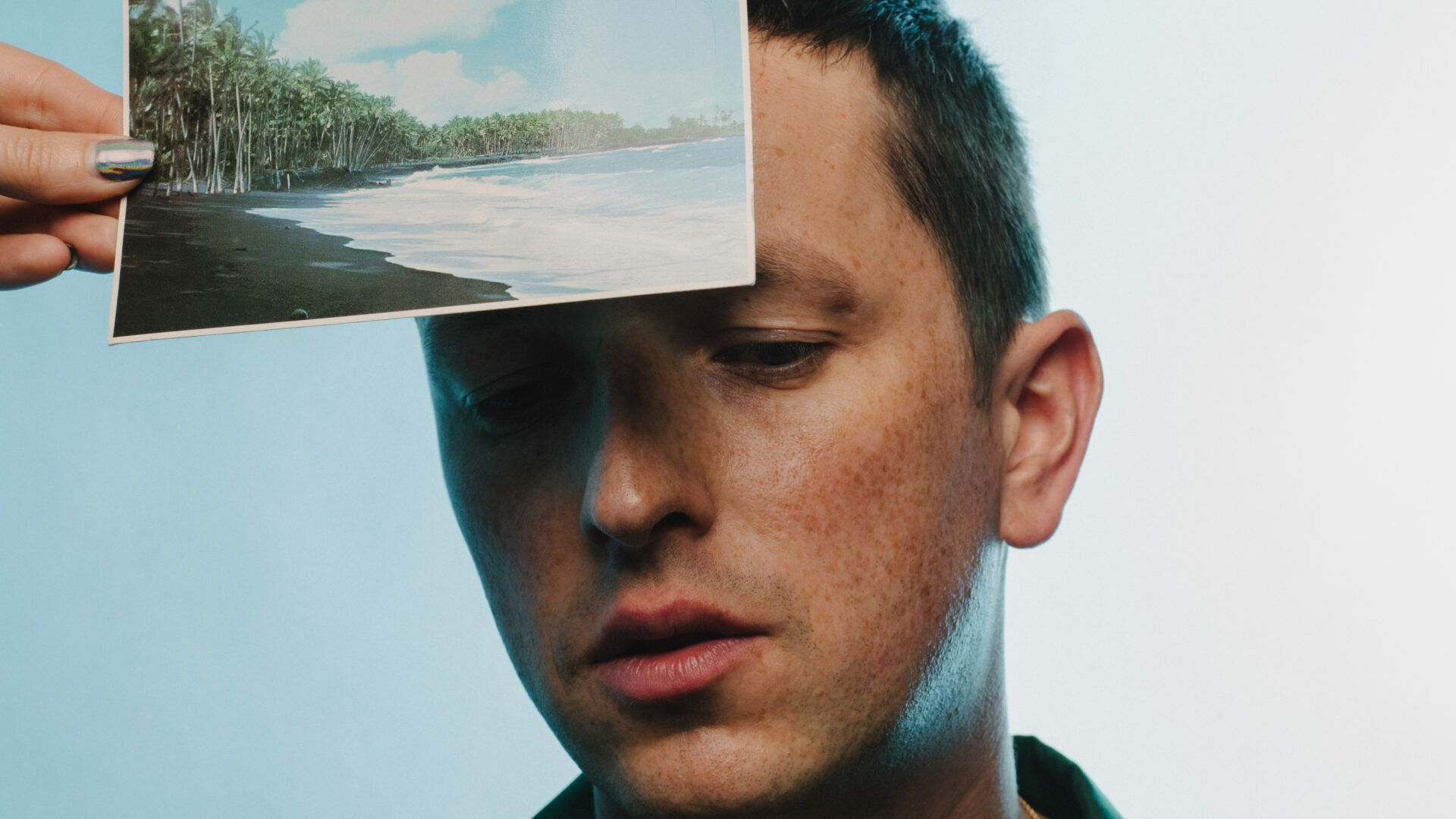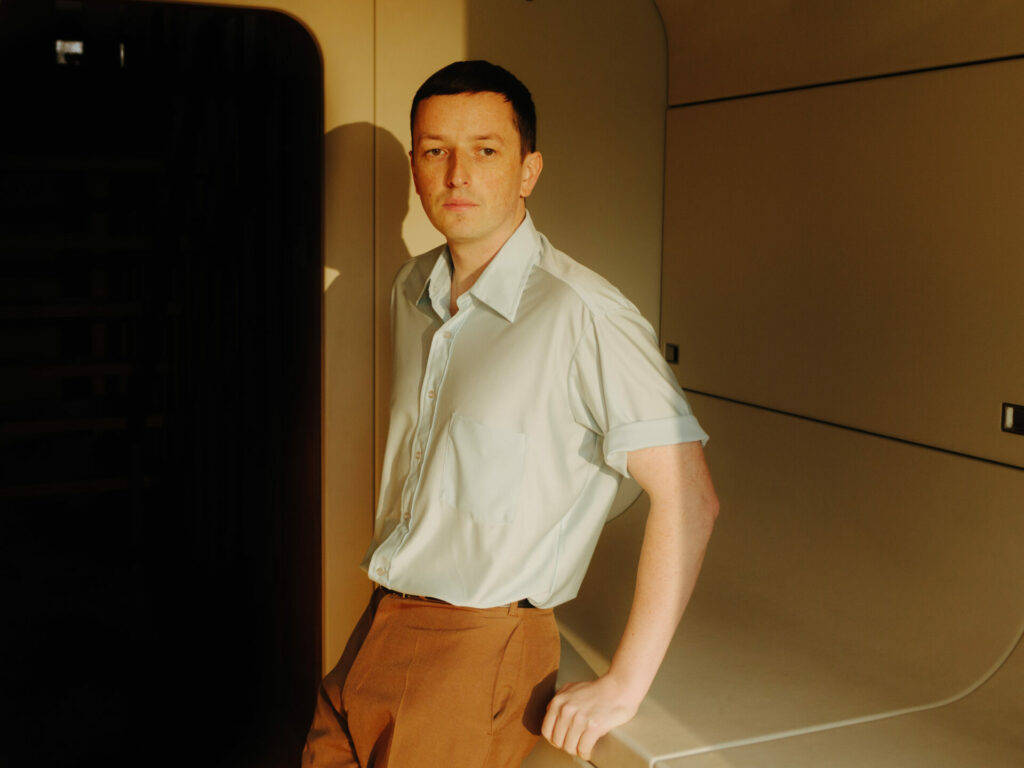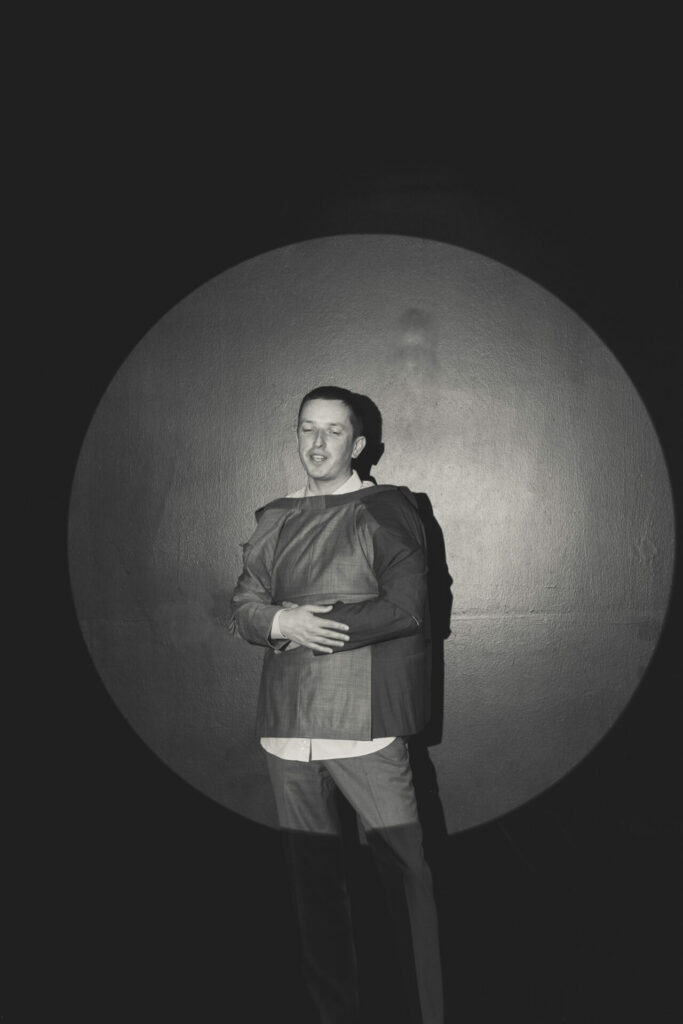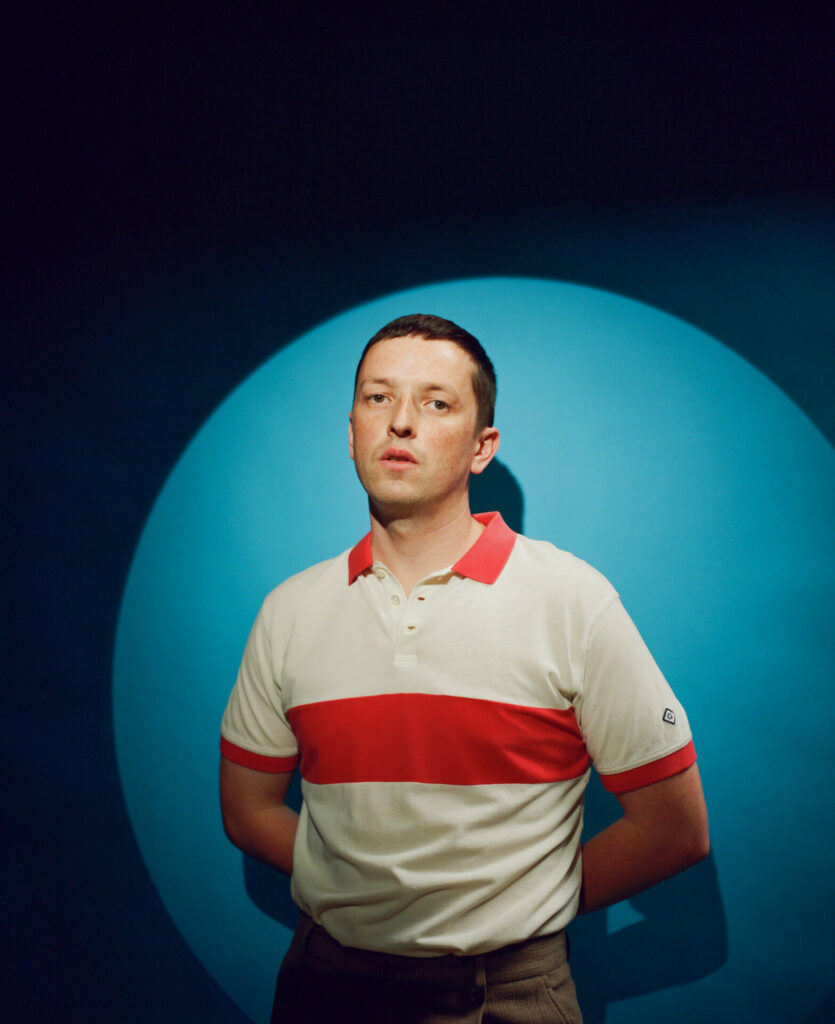10 years later, Totally Enormous Extinct Dinosaurs feels like he’s grown up
A decade ago, electronic musician Orlando Higginbottom was DJing around the world, winning awards, and remixing superstars — but he wasn’t happy. Today he’s sober, more hopeful, and ready to release ‘When the Lights Go’, a long-awaited second album of existential pop songs
By Lina Abascal

“There’s nothing cool about being a DJ anymore,” says Orlando Higginbottom, the man behind the electronic music project Totally Enormous Extinct Dinosaurs. “It’s so absolutely run of the mill and uncreative. I can’t believe we’ve bought into it for so long.”
If anyone should know, it’s Higginbottom. When he first debuted as Totally Enormous Extinct Dinosaurs (or T.E.E.D. for short, an artist name he chose because it could never sound cool or trendy) in the late noughties, the Oxford-raised, Los Angeles-based artist quickly found himself in the middle of a career that many aspiring artists can only dream of. He toured extensively as a DJ, put out buzzy dance tracks, and released official remixes for the likes of Lady Gaga, Katy Perry, Sky Ferreira, and Disclosure. He signed to a major label, Polydor Records, for his 2012 debut album Trouble, which won plaudits both within the electronic music scene (it was crowned DJ Mag’s album of the year) and outside of it (the BBC ranked it at number five in their end-of-year album poll).
A path like that usually sets you up to be flying around the world, partying and collecting large fees to DJ to, as Higginbottom puts it, people in “wide brim hats with too much money”. His once-peers now have residencies in places like Ibiza, Mykonos, and Tulum, where the lifestyle around dance music supersedes the music itself, and partiers check off a Bingo board of clubs to visit and DJs to take selfies with. But instead, it’s been a decade since the last Totally Enormous Extinct Dinosaurs album, and Higginbottom is keeping his distance from DJ culture, even if it costs him.
When we meet at a café in Los Angeles’s Silver Lake neighbourhood, Higginbottom is wearing Tom Ford sunglasses and rocking a cool-guy moustache, but as soon as we sit down, he peels off the shades and transforms into a far more unassuming character. He’s an open book, laughing at himself and speaking freely about his qualms with the industry and past mistakes. Still, he keeps his voice down — the ears of managers and influencers everywhere in this part of town (at one point, our conversation pauses for a courtesy hello to a pair of music industry bros). Higginbottom moved out to LA nearly eight years ago, and while he doesn’t participate in the city’s songwriting and studio session culture (“music by committee”, he says), he considers the place his home. The things most transplants struggle with — the city’s sprawling suburban landscape and isolating nature — appeal to him. It’s an easy place to disappear, whether to focus on art, or to slip through the cracks. He’s spent the last eight years doing both.
“I was working my arse off and I don’t have anything to show for it. Sure, I have amazing memories — but not really, because I was drunk the whole time”
— Totally Enormous Extinct Dinosaurs’ Orlando Higginbottom
We’re here to talk about When the Lights Go, the long-time-coming second album that Higginbottom wrote and produced in Los Angeles, finished in Lisbon, and mixed in London. This time, he’s swapped the clubby, almost stadium-ready beats of Trouble for sombre keys and lyrical reflections that can only come from a near-decade of perspective. He’s getting ready for a tour where he’ll perform the album live too, singing in concert venues rather than DJing in clubs. A lot had to go right — or wrong — to get to this point.
It wasn’t long after the release of Trouble that Higginbottom felt the itch of the strings attached to his choices. In 2012, the thick of the post-electro, EDM boom, there were more opportunities than ever for a buzzing cohort of mostly white, mostly male, 20-something DJs to play festivals, tour constantly, get remix commissions, and repeat. This churn-and-burn career left him feeling unstable, and drinking too much to compensate. He was struggling financially, too. Despite his deal with Polydor — owned by Universal Music Group, today valued in the tens of billions — he didn’t own his own master recordings, and felt ill-equipped for a sustainable music career.

“I realised I would never make any money out of Trouble,” says Higginbottom. “I’d never own it, and there was this perpetual idea that it needed to be better. It needed to be bigger for it to really work.” His vision for the project was to perform it live with vocals and keyboards, but because the album took too long to make money, the label never prioritised it. “I was working my arse off and I don’t have anything to show for it.” It’s clear he’s conflicted about this time as he debates how hard to be on himself. “Sure, I have amazing memories — but not really, because I was drunk the whole time.”
Higginbottom, now 36, has kept a low public profile the last half-decade, though he has privately been working on music nearly every day. In 2020, he quietly released I Can Hear the Birds, a four-track ambient EP made from recordings of bird calls. That same year, ‘Heartbreak’, his disco-inspired collaboration with Bonobo, landed him a Grammy nomination for ‘Best Dance/Electronic Recording’ — his first. But from the outside, the melancholy, lyric-driven T.E.E.D. sound was nowhere to be found.
His hard drives were full, though. In order to piece together what would become When the Lights Go, Higginbottom sifted through 10 years of unreleased songs. He separated one hundred tracks thematically into three buckets: hopeful, feverish and anxious, and “straight up sad shit”. In the end, all 17 tracks on When the Lights Go came from the sad pile. “It ended up being more personal than a listener would actually want,” Higginbottom says. Lyric-driven songs, let alone lyrics about personal experiences, aren’t necessarily common in electronic music, something Higginbottom recognises — he categorises the album more as a sad pop record. “And I don’t use ‘pop’ ironically,” he insists. If anything, it’s closer to the emotional dance-pop of The 1975’s earlier work. “I think people who have been following me will not be surprised by this,” he says, “but somebody who hasn’t been paying attention who reads Mixmag may be a bit like ‘Why is this guy singing about love? Again?’”

Every song on When the Lights Go is a love song, whether that’s about understanding the difference between toxic and healthy relationships, or how to grapple with finding and sustaining love in a world that’s crumbling. “I think that the record starts and all the ideas are quite direct, and then it gets murkier and murkier as it goes on,” says Higginbottom. The album ends on the two “most murky, depressing, dystopian, songs.” One of the murkiest is the album closer, ‘Thugs’, a piano and saxophone tune about “being born into a violent patriarchal world and how you are just fucked just by being here and growing up in it.” On it, he sings, “Fucked on arrival / touch for survival / Realise it’s only ever thugs that get by.”
‘Basement’ and ‘Silence’, the album’s only instrumental tracks, serve as palate cleansers, placed to give listeners a break from his voice. Singing isn’t new to Higginbottom — he spent his childhood studying classical music, and was a chorister in the Oxford choir his grandfather conducted — but he’s still insecure about overdoing it. “I am really only a singer in the way that I like writing songs in the studio,” he says. “Obviously I am not the guy at the house party strumming the guitar. I hate the sound of my voice in that sense. I am weary of fatigue.”
“At the time, I was like, ‘This is a great love song.’ A year or two later, I revisited it and listened to it again and was like, ‘Oh, this is absolute misery’”
— Totally Enormous Extinct Dinosaurs’ Orlando Higginbottom
As well as love, Higginbottom also focuses on climate change and “existential threats to our lives”. The two subjects often intertwine. ‘Blood on the Snow’, a beautifully eerie song featuring Higginbottom’s falsetto, is about longing to have children, but worrying about what the future may hold for them. On it, he asks, “How much longer before the dam begins to break? / Crashing water, fill my lungs and levitate,” before singing, “I want her more than you know / Names for a daughter, blood in the snow.”
Constructing an album out of songs written over the course of 10 years was like having access to a time machine. Listening back to old sessions transported him to different relationships and past perspectives. When he revisited one track, ‘The Sleeper’, he remembered the day he recorded it: “At the time, I was like, ‘This is a great love song.’ A year or two later, I revisited it and listened to it again and was like, ‘Oh, this is absolute misery.’” What he once thought was love was actually his own insecurity and self-doubt. “I hurt too many people, I don’t think that love deserves my name / But you need me, all the same,” he sings.

During lockdown, Higginbottom said goodbye to the Hollywood Hills house that he loved and went back home to the UK, to be with his family and to work on finalising what would become When the Lights Go. It also meant he was closer to Lisbon, where he finished the record while hiding out for part of the pandemic. But his decision to leave LA was motivated by his financial situation, too. “I was looking at my numbers and was like, well my business relies on me being able to go and DJ. I could have stayed in LA the whole time, but I would have gotten down to zero dollars by the end of it.”
When the Lights Go is being self-released on T.E.E.D.’s own record label, Nice Age. “I am so fucking grateful that I don’t need all these middle men,” he says. “My equation for how my business works is super tight. If I didn’t self-release, I could see myself in real trouble in five or 10 years, when I don’t want to tour anymore.” Now, he tries to educate others about the predatory nature of the music business, but acknowledges that the stuff that people gravitate towards — mouthing off on Twitter about Spotify’s paltry pay rates — gets more views than useful, educational documents. “I really wish that what we were presenting to 23-year-old artists was the stable model from the beginning, rather than being like, ‘Yeah, you go fuck yourself, and then come back once you’ve learned your lesson.’”
Higginbottom has learned a lot of lessons himself. The elaborate, Native American-appropriating headdress that he used to wear on stage is long gone, and with full control of his live show, T.E.E.D. is swapping theatrics for a deeply personal performance that matches the tone of the album. He’s now sober, and with 10 months under his belt, he’s looking forward to “raw-dogging the experience” of performing. “It’s just like, ‘Here I am, performing my second album, I hope you like it,’ which is a very different prospect than before,” he says.
When I ask where he’s at with love these days, he pauses. “I feel like I’ve grown up,” he says. “It’s kind of nice to get this material off my chest. The next record I’m working on is much more hopeful.” It may take 10 more years for him to get there, but he’s in no rush. “I’ve come out and I’m very far over the other side now.”
Totally Enormous Extinct Dinosaurs’ new album When the Lights Go is out 9 September.
